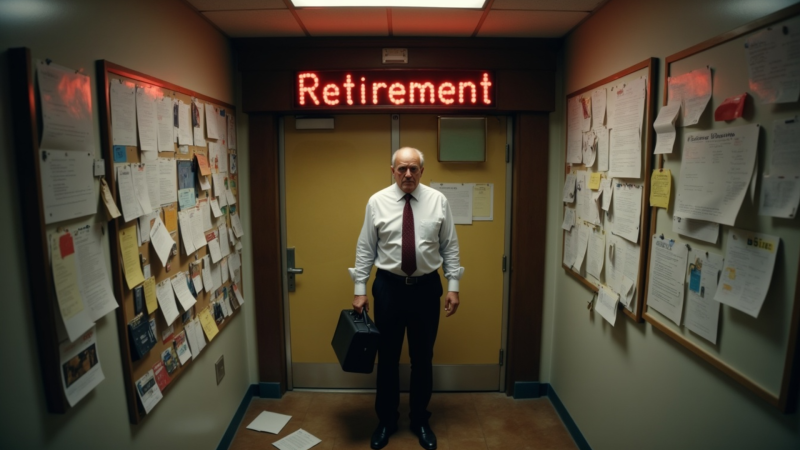

Retirement Is a Deadline With No Extension Policy

The majority of us are experts at stretching deadlines, let’s face it. Give your project a little more time. Before getting out of bed, take one more nap. Before we “really” begin saving for the future, we have a few more months (or years). However, retirement is the one deadline that never changes, never gives grace periods, and never considers last-minute compromises.
Retirement is a significant financial and lifestyle milestone that requires careful planning; it’s not merely a stage of life. What’s the kicker? Once it arrives, you are unable to request an extension. The day will come when your bills cease coming in but your pay cheque stops coming in, whether you’re ready for it or not. Furthermore, your readiness or lack thereof will be more noticeable at that point than any pledge you made to “start saving next month.”
Let’s unpack why retirement truly is a deadline with no extension policy, and what you can do about it before it’s too late.
The Illusion of Time
Time has a strange way of slipping past our fingers. In your twenties, retirement appears to be a distant planet that you may visit one day. You’re in your thirties and are working on establishing a career and potentially starting a family. By your 40s and 50s, the reality of retirement begins to knock, but if your funds haven’t kept up, the knock seems more like a pound.
One of the most common traps is the illusion of time itself. We subconsciously place retirement under “future problems” since we don’t see it as an immediate expense like rent or school tuition. Unfortunately, that thinking leads to undersaving, delayed investing, and an overreliance on last-minute miracles.
Let’s be clear: retirement planning isn’t about guessing what you’ll need in the future; it’s about ensuring the life you want isn’t cut short by the limits of your bank account.
Retirement Planning Is Not Optional
A retirement plan is not a luxury for the ultra-disciplined or the wealthy. It’s a necessity, like insurance, rent, or your morning coffee. The longer you delay it, the heavier the price you pay.
Think of it this way: Retirement isn’t the finish line. It’s the moment the rules change. Your active income takes a backseat, and your retirement benefits, investments, and savings have to carry you forward. If you haven’t built a strong foundation, that transition can feel more like a cliff than a gentle slope.
The question is not, “When will I retire?”. aberration “When will I be able to afford to retire?” That amount, your retirement savings, is decided by:
Your lifestyle goals
Healthcare expectations
Inflation
The number of years you plan (or hope) to live post-retirement
If you haven’t run the math on how much you’ll actually need, it’s time to stop relying on guesswork and start building a real strategy.
The Cost of Waiting
Every year you delay saving or investing for retirement, you’re giving up two valuable assets: time and compound interest. These two are the quiet superheroes of financial planning. The earlier you start, the more they can do for you, without you having to do much at all.
Let’s illustrate:
- Start saving ₹10,000/month at age 25, earning 10% interest annually, and you could retire with over ₹2 crore by 60.
- Start the same ₹10,000/month at 40, and you’ll end up with around ₹76 lakhs.
That’s the difference between a retirement filled with choice, comfort, and maybe some travel, and one filled with compromises and financial anxiety.
The clock isn’t just ticking, it’s compounding. And every tick you ignore makes the climb steeper.
“Don’t count the days, make the days count.”
— Muhammad Ali
The Myth of the Government Safety Net
Many people fall back on the idea that government pensions, employee provident funds (EPF), or public schemes will be “enough” for retirement. The reality? These are supplements, not solutions.
Most public pension schemes barely cover basic living expenses, let alone rising medical costs or the kind of lifestyle you may hope for after decades of hard work. Even employer-sponsored retirement plans often fall short unless you’re actively contributing and investing beyond the bare minimum.
If you’re planning your retirement around government support alone, you’re essentially giving up control over your future.
What a Real Retirement Plan Looks Like
So what should your plan include?
Defined Financial Goals
Decide what kind of retirement you want. A peaceful life in a smaller town? A bit of globe-trotting? Supporting your children or grandkids? These decisions affect how much you’ll need.
Clear Savings Strategy
Set aside a fixed percentage of your income monthly. Automate it if possible. Your future self will thank you.
Investment Discipline
Don’t just save, invest. Use instruments like mutual funds, PPFs, NPS, index funds, or even real estate to grow your money. Get professional advice if needed, but don’t let fear or confusion keep you on the sidelines.
Regular Reviews
Life changes. So should your plan. Review it yearly, adjust for inflation, and adapt based on income shifts, health updates, or changing family responsibilities.
Emergency Fund & Health Insurance
Don’t let an unexpected medical bill or emergency derail your retirement. A well-funded emergency reserve and robust health cover are essential safety nets.
Stop Relying on the Safety Nets
Here’s the harsh truth: Government pensions and company retirement benefits aren’t designed to maintain your lifestyle, they’re designed to keep you afloat. If your post-retirement dreams involve more than just “surviving,” you’ll need to plan for that independently.
And let’s be honest, “working forever” isn’t a real plan. Your energy, health, and opportunities aren’t infinite. Don’t treat your future self like a backup plan.
Final Thoughts
Retirement is a one-way street. Once you’re on it, there’s no U-turn and no delay button. And while you can keep working if you want to, working because you have to is an entirely different reality, one you don’t want to leave to chance.
Start planning today. Because the future doesn’t come with a grace period.
“Do not save what is left after spending, but spend what is left after saving.”
— Warren Buffett
Recent Public FAQs
It depends on your lifestyle, health needs, and expected retirement age. A common rule is to aim for 20–25 times your annual expenses.
As early as possible. The sooner you start, the more you benefit from compound interest—and the less you have to invest monthly.
Usually not. They’re good starting points but rarely sufficient alone. You’ll likely need to supplement them with investments like mutual funds or real estate.
It’s not too late, but you’ll need to save aggressively, cut unnecessary expenses, and invest smartly to catch up.
Absolutely. Inflation erodes the value of money over time, so your retirement corpus must grow accordingly.
It depends on your lifestyle, health needs, and expected retirement age. A common rule is to aim for 20–25 times your annual expenses.
As early as possible. The sooner you start, the more you benefit from compound interest—and the less you have to invest monthly.
Usually not. They’re good starting points but rarely sufficient alone. You’ll likely need to supplement them with investments like mutual funds or real estate.
It’s not too late, but you’ll need to save aggressively, cut unnecessary expenses, and invest smartly to catch up.
Absolutely. Inflation erodes the value of money over time, so your retirement corpus must grow accordingly.

Millionaire Mind Intensive is about unlocking your financial freedom and strengthening your relationship with money.
Quick Links
Contact Info
Success Gyan India LLP
S5, Thiru Vi Ka Industrial Estate,
Guindy, Chennai – 600032







